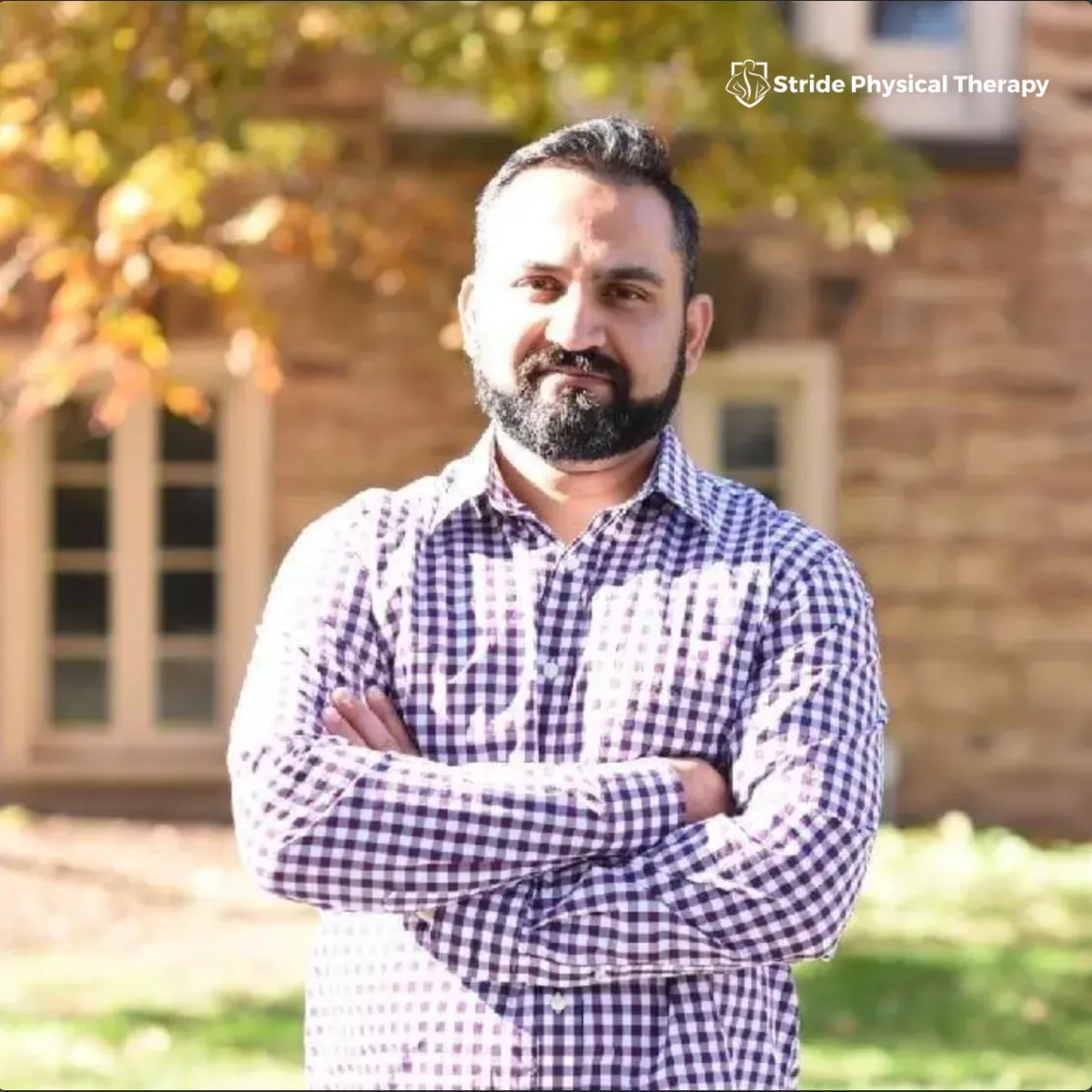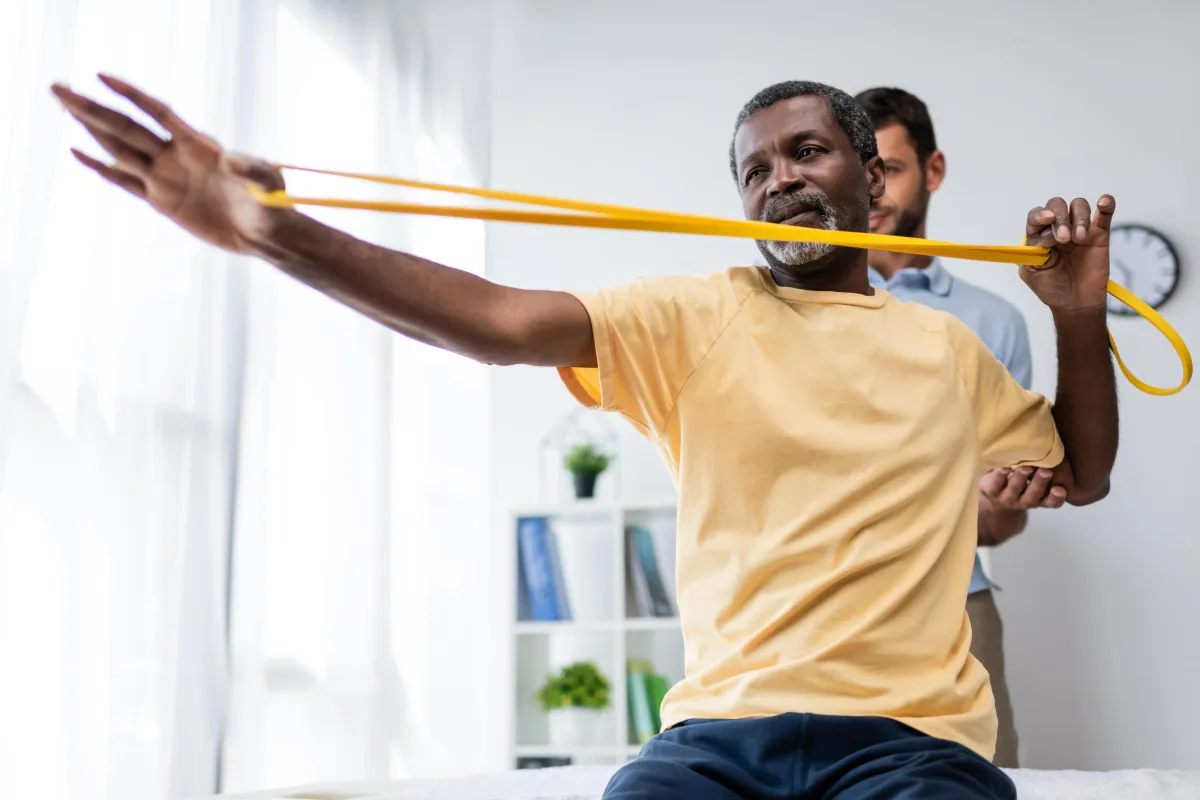The rotator cuff consists of four muscles that stabilize your shoulder joint and aid in lifting and rotating your arm.
A rotator cuff tear happens when the tendons—tough, connecting tissues from muscle to bone—around your upper shoulder bone come loose. This injury can cause pain and make it hard to move your arm, troubling routine tasks like brushing hair, grabbing things from a shelf, or lifting a bag.
Common Causes of Rotator Cuff Tears
Frequent overhead movements and certain jobs, like painting, increase the risk of rotator cuff injuries. These tears can develop from ongoing strain or sudden actions. For instance, if you switch to tennis after winter without adequate preparation, you might tear your rotator cuff. Overlifting, excessive arm use during activities like moving, or injuries from a fall or shoulder dislocation are also typical reasons for these tears.
Symptoms of a Rotator Cuff Tear
Experience a constant, dull shoulder pain that intensifies when you lay down.
Feel discomfort from the shoulder to the upper arm.
Notice a pop or crack when moving your arm.

Quick Links
FAQs
Experience shoulder pain during overhead lifts or throws, or even at rest.
Noticeable arm weakness.
Sensation of your shoulder being stuck.
Best Treatment for Rotator Cuff Tears
At Stride Physical Therapy, your shoulder specialist will inquire about your pain's history—its onset, whether it was injury-induced or slow-developing, and what eases or intensifies it.
Your visit will start with a physical exam where your Freehold, NJ shoulder specialist will check for pain points by pressing on your shoulder and moving your arm in different positions. They'll also measure how far and easily you can move your arm on your own. An X-ray might be done to see if there are other causes of pain like arthritis or bone issues, although it won't show torn rotator cuff tendons. An ultrasound, which uses sound waves, may be used for a quick and detailed view of your shoulder, helping to direct treatment injections if needed. Finally, to get the clearest picture of your rotator cuff tendons and to check for tears, your doctor will probably request an MRI.
If you have a rotator cuff tear, your Freehol, NJ specialist will likely suggest trying non-surgical options first. This includes resting the shoulder and doing physical therapy to build up nearby muscles. They'll usually not recommend a sling, to prevent a condition called frozen shoulder. Taking anti-inflammatory drugs or getting corticosteroid shots can also ease inflammation and lessen shoulder pain, making movement easier.
Surgical Solutions
If your shoulder pain persists despite non-surgical treatments, consider surgery. This minor procedure uses an arthroscope to examine the rotator cuff for tears. While deeper and complete tears are repaired surgically, shallower ones might just be cleaned. To mend the tear, sutures and anchors reattach the tendon to the upper arm bone, encouraging healing. Post-surgery, you'll wear a sling for 4 to 6 weeks to immobilize the shoulder and protect the repair. Physical therapy follows to restore mobility and strength to the shoulder.
MEET YOUR RECOVERY TEAM

Kanwal Bhardwaj
PT, M.Sc.PT, CIMT, CMNT
Meet Kanwal Bhardwaj, PT, M.Sc.PT, CIMT, CMNT, the driving force behind Stride Physical Therapy in Freehold, NJ. With over 20 years of dedicated experience in the field, Kanwal brings a wealth of expertise and a passion for holistic healing to his practice. Kanwal's journey began with a Master of Science in Orthopedic Physical Therapy from Quinnipiac University in 2004. Over the years, he honed his skills and gained invaluable insights during 18 years of service in outpatient physical therapy offices. In 2014, fueled by a desire to deepen his understanding of patient care, he pursued a manual therapy certification (CIMT). This transformative experience allowed him to adopt a whole-body perspective, focusing on treating the root cause rather than just the symptoms...
At Stride Physical Therapy, we're dedicated to transforming lives. With a focus on the root cause of your condition, we're here to help you regain mobility and embrace an active lifestyle. What sets us apart? Our genuine passion for what we do. Let's stride towards a brighter tomorrow together.
Elevate Your Health with Our All-Inclusive Wellness Services!
Take one step closer to a pain-free life with Stride Physical Therapy! Discover medication and surgery-free solutions with our sessions.
Health Blog

Preparing for Surgery? Try Pre-hab to Speed up Your Recovery Process.
Getting ready for surgery? Understand that rehabilitation after surgery is key for a speedy recovery. It returns your movement and helps you stand on your feet again. Interestingly, rehabilitation before surgery, known as pre-hab, can also make your post-surgery recovery faster and even enhance the outcome of your surgery. Pre-hab means working with a physical therapist to prepare your body for surgery. Post-surgery, rehab takes over the healing process.
For a swift return to your daily life after surgery, consider Stript Physical Therapy in Freehold, NJ. Our dedicated team designs a personalized treatment plan to expedite your recovery and prepare you for your upcoming surgery.
Understanding Pre-hab vs. Rehab
Pre-hab: Participating in a pre-hab program with a physical therapist helps you get a head start on recovery and ensures a more successful surgery. Your therapist will prescribe exercises and therapeutic modalities to reduce inflammation and increase strength, giving your body an advantage as it heals from surgery. Even a few sessions can improve your overall health, so you have more strength to draw on post-surgery. Pre-hab prevents extreme weakness after surgery by building up your strength in advance.
Rehab: While pre-hab prepares your body for surgery, rehab focuses on strengthening your body afterward. Post-surgery pain and discomfort are natural, and certain motions may be challenging. However, it’s crucial to maintain movement to regain your range of motion and ensure a full recovery. Rehab helps you move safely, prevent reinjury, fight inflammation, and keep painful adhesions from forming. It also builds strength to help you quickly return to your routine.
What Results Can You Expect from Pre-hab?
Pre-hab dramatically helps people about to have surgery. Research from the Arthritis Foundation found that patients doing pre-hab recovered better after surgery and could leave the hospital sooner. Knee replacement patients who did pre-hab could walk and climb stairs well enough to be discharged from the hospital faster than those who skipped pre-hab.
Get a Jump Start on Your Recovery with Stride Physical Therapy
The health benefits of pre-hab are undeniable. If your surgery date is approaching, call Stride Physical Therapy in Freehold, NJ today to take advantage of our strengthening pre-hab services. Our team of dedicated movement experts will help you improve your strength before surgery, ensuring a smoother post-operative outcome and a faster recovery. Don’t face this journey alone—contact Stride Physical Therapy today to get the supportive, knowledgeable care you deserve.


